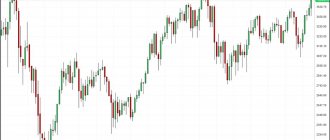There are people who turn to trading solely out of scientific interest - they are fascinated by economic processes, and studying the market becomes a real hobby. But it is worth recognizing that most traders turned to the exchange precisely for the sake of making money. Some expected easy money, others initially expected hard work - one way or another, traders work to ensure a comfortable life for themselves. How realistic is this in the current market? How much will a beginner earn in securities? Let's figure it out now.
Bank deposits - how much do you earn from investing in them?
Opening a deposit in a bank is a subtype of investing. This direction fully corresponds to the concept of passive income; you do not need to do anything other than directly open an account. Interest on a deposit is a kind of payment from the bank for using your funds and making money from it.
Deposits are chosen more out of habit; in terms of profitability , this is perhaps the most unprofitable option. The risks are extremely low (deposits are insured by the DIA, and the probability of bankruptcy of a large bank is almost zero), so the interest is low. To understand the potential of bank deposits, keep an eye on the rate of the Central Bank of the Russian Federation; the interest on the deposit will never exceed this figure several times.
On banki.ru, for any deposit period, 5-6% is considered a very good return . With real inflation of 5-5.2%, this will give a real return of 0.8-1.0%. Because of this, deposits are called more of a protection against inflation than a highly profitable instrument.
To invest in a bank deposit, you just need to open an account and deposit money into it.
Adviсe
Here are some tips for beginners:
- Remember about T+2 - this is the operating principle of the Moscow Exchange. It means that the buyer of a security becomes its real owner on the second business day after the completion of the transaction. “But I can immediately put the stock back up for sale!” - a novice trader will exclaim. Yes, that's right, you can. But for two days, you have no rights to other income and property rights that come with owning a security, such as dividends. Let's imagine that today you bought shares of a company that tomorrow closes the register of shareholders and, accordingly, pays dividends. You are missing out on this income because you did not buy securities in advance. Likewise, you will not have the right to vote at shareholder meetings if you purchased a share before two business days have passed.
- Never give in to emotions. Working on the stock exchange (especially trading) can make you excited - this is a path to large losses. The exchange cannot be regarded as a lottery or slot machine. If previous trades were unsuccessful, this does not mean that the next one will necessarily bring you profit. To maintain peace of mind, after several losing trades, disconnect from the exchange for some time. Close the chart window, turn off your computer, and do something relaxing. You can meditate if it helps you calm down and focus on rational analysis. Trading on emotions is the worst strategy and will only lead you to disappointment and loss of money.
- Don't spend everything you earn. One of the areas of work on the stock exchange is increasing your capital. If you want to spend less time working over time and earn the same amount (or more), you should increase your capital. Add at least part of the earnings to your brokerage account.
How much do you earn on corporate and government bonds?
A bond is a debt instrument; it can be denominated in national or foreign currency (in this case we are talking about Eurobonds). Bonds are created so that business and the state can raise funds on conditions convenient for themselves. From the point of view of profitability, bonds are analogous to a deposit in a bank, but the debt instrument does not have a number of disadvantages of bank deposits.
Profitability depends both on the reliability of the issuer itself and on the state of the economy of the corresponding country. The more stable the situation and the more reliable the issuer, the lower the annual coupon.
Nominal yield options:
- OFZ. Since the issuer is the Ministry of Finance of the Russian Federation, the annual coupon gives approximately the same capital growth as a deposit in a bank. There is also a connection with the rate of the Central Bank of the Russian Federation.
- Corporate bonds issued by large, reliable companies. The coupon can be 1-3% higher than the OFZ yield.
- Bonds issued by small companies or businesses experiencing financial stability problems can provide yields of up to 10% or higher. True, the risk that the issuer will not fulfill its obligations also increases.
To determine how much you can actually earn from investing in bonds, you need to subtract inflation for the year from the annual coupon . The remainder is the real return, taking into account currency depreciation.
One of the main arguments when choosing OFZ instead of a bank deposit is the absence of a number of restrictions. For example, the profitability does not change depending on the amount invested, there are no time limits. You can always sell bonds and not lose the accumulated coupon income.
To buy bonds you only need a brokerage account. All licensed brokers of the Russian Federation provide access to the Moscow Exchange, any client can buy the necessary bonds. The denomination of most ruble bonds is 1000 rubles, so the entry threshold is minimal.
If we do not limit ourselves to the Russian market, the picture does not change fundamentally. You can rely on research from Credit Suisse; a detailed report is published annually, which analyzes real and nominal yields, including bonds. Between 1900 and 2021, bonds yielded about 2.1%, taking into account the depreciation of the dollar.
These indicators are somewhat arbitrary as they are calculated over a long period of time. With a time horizon of 3-5 years, severe distortions are possible. For example, due to the coronavirus pandemic, US Treasury yields have fallen sharply.
Pros and cons of the profession
Among the advantages of the profession they note:
- Virtually limitless opportunities for growth. Investments are easily scalable and potentially limited only by the amount of capital.
- There are no production costs. The investor bears the risks associated with his analytical and professional skills, but does not have any other costs for making a profit.
- All profit is the result of mental activity and mathematics.
- Privilege and status.
- Own work schedule.
- Part of the work can be entrusted to artificial intelligence (data collection, analysis, event tracking).
The disadvantages are the following:
- To get a good income, private investors need to have a fairly large capital. Therefore, in the initial stages, investing from scratch will not help you quit your job.
- Analytical work is not for everyone.
- Constant risk of loss of investment.
- Dependence on external factors: inflation, taxation, legislation.
How much can you earn from real estate investments?
Within this area, there are several subtypes of investments:
- Through escrow accounts even before the construction of the facility . Gives about 7-10% nominal return, which is comparable to investing in the stock market.
- Purchasing housing participating in the renovation program . In theory, it can give 10-20% per annum, but such a scheme is extremely difficult to implement. Even if you manage to select a suitable object, the owners are guaranteed to inflate its cost.
- Working through REITs . This is an analogue of an ETF, but the work is carried out with real estate all over the world. The investor buys shares of the REIT, and the fund manages the properties. This is an indirect investment in real estate; you do not buy square meters, but earn money due to the fact that the REIT manages them.
I also recommend reading:
ITI Funds are ETF funds focused on the Russian stock market. Company overview
The Moscow Exchange offers ETFs from two providers – FinEx and ITI Funds. The latter has only two funds: […]
The first two options are good because the investor receives ownership of real housing or industrial premises. For some, from a psychological point of view, it is critically important that the investment object exists in reality and is their property. If the property is located in a promising developing area, then at a distance the profitability can outpace investments in the stock market.
As for REITs, from a technical point of view, investing in them is no different from buying ordinary shares. All you need is a brokerage account, money in it and access to the desired market. In terms of profitability, REITs are slightly ahead of the stock market . A comparison between the SPY ETF (which mirrors the S&P 500) and one of the largest REITs in the world is instructive.
The average REIT yield is about 8-11% per annum, taking into account inflation.
Trends 2021 - what people are investing in in Europe and the world
One of the global trends in all industries is speed. Almost any industry is now developing very quickly and changing every day. Data processing speed is increasing and software capabilities are improving. Digitalization and the global transition to online under the influence of the pandemic are increasingly influencing even the most conservative areas.
Monitoring venture deals around the world allows us to understand which startups and industries investors are interested in. For example, this is how the volume of investment in different industries has changed over the past 7 years in Europe:
Volume of venture investments in Europe by industry in 2013-2020, KPMG research
There is a clearly visible trend of a gradual increase in funding for software projects (turquoise color on the graph), which includes mobile applications, services and programs. The global VC market saw a boom in pharma and biotech in 2021 (dark blue segment):
Volume of venture investments by industry in 2013-2020 worldwide, KPMG research
The focus of a startup alone tells the investor little about the prospects of the project. A much more important indicator is the size and potential of the selected market. The most attractive market for our fund is not tied to a particular geography, it exists globally and is divided between players without a strict monopoly. It is important that there are a number of solvent potential customers in the world whose total costs for purchasing this (or similar) service exceed $10 billion per year.
Precious metals - how much can you earn?
Precious metals are not limited to investments only in gold. You can invest in silver, platinum, palladium.
There are several investment options with different returns:
- Buying bullion . Due to the large spread and VAT that has not yet been abolished, even with an increase in the cost of the precious metal, the investor loses up to 15-30% of income.
- Buying investment coins. There is no VAT, but there remains a large spread when buying and selling coins, and besides, coins and documentation for them must be stored in suitable conditions.
- Compulsory medical insurance. A bank account in grams of precious metals is convenient, but there is also a large spread when opening an account (virtual purchase of precious metal) and closing it (virtual sale of metal).
- ETF shares backed by the corresponding precious metal.
- Shares of companies mining precious metals . This is an indirect investment in precious metals, but there is a correlation between the quotes of the same gold and the shares of gold mining companies.
From a convenience point of view, the most comfortable way is ETF shares. To do this, you only need a brokerage account and money in it.
As for how much you can earn from investing in precious metals, this is one of the most difficult assets to predict. It is recommended to invest in gold and other precious metals during periods of instability; precious metals play the role of a “safe haven” and rise in price.
During periods of calm, quotes can remain in a horizontal range for decades.
I also recommend reading:
Just2Trade is a universal broker (stocks, bonds, forex, etc.). Review and reviews 2021
Broker Just2Trade (official website) is an interesting company; in addition to standard brokerage services, Just that Trade offers, for example, access to an IPO, […]
The ideal investor: who is he?
As numerous studies show, according to portfolio companies, the ideal investor is one who:
- comfortable in interactions and professional communications;
- really useful with its business qualities for startups;
- able to make business decisions at a strategic level.
To this we can add a few more opinions. For example, according to experienced entrepreneurs, a competent investor always makes his proposals and recommendations for changes to the project before investing. At the same stage, they are always interested in potential projects that can complement the existing one in a financial or technological aspect.
It is important for an entrepreneur to learn that a good investor can always provide more than just money. In particular, the product management he proposed for a company just beginning its development is:
- professional assessment of manufacturers and suppliers of products and their motivation;
- building effective logistics;
- qualified consulting on problems of business architecture of enterprises.
At the operational level:
- adjustment of development roadmaps;
- legal structuring of business;
- opening of a new office;
- pragmatic and streamlined approaches to financial reporting.
The result of all this may be a young company reaching a fundamentally different level of work and corporate governance.
How much can you earn by investing in cryptocurrency?
The direction is not new; all investors know about crypto in general and Bitcoin in particular. This asset cannot be recommended as the basis of an investment portfolio; it cannot be considered as the basis of an instrument that can grow or fall 10+ times in a year. But it is still recommended to allocate part of the capital to crypto; this is an investment with the expectation of multiple growth in the future.
It is almost impossible to predict the future of crypto. The same analysts can change their point of view, either promising a bright future for cryptocurrency, or predicting the imminent decline of Bitcoin, followed by altcoins.
So far, everything indicates that cryptocurrency will remain in the life of mankind. The only question is at what price levels the roller coaster will end and volatility will decrease.
As for growth potential, Bitcoin, Ether and other coins have already proven that even from record levels they can grow 2-3 times. This is the most risky direction, but the monthly profit can exceed 100%, however, over the same period you can lose 80-90% of the investment.
I also recommend reading:
What is default in simple words? Causes and consequences. How to protect savings from default?
Default (bankruptcy) - in simple words, is the failure of the debtor to fulfill his obligations under the loan. Non-fulfillment means non-payment of interest, the body of the loan itself [...]
Where to learn investing
Since an investor is a broad concept, which can conditionally include a lot of specialized specialists, there is no classical education in this area. In any case, on the territory of post-Soviet countries.
The closest university specialties for students planning to connect their lives with investments are:
- Economics and Law - Investors tend to have an excellent understanding of certain sectors of the economy. This is useful for both entrepreneurs and specialists involved in buying and selling securities on the stock exchange.
- Finance and management is a recently emerged area that helps to understand the structure of financial markets, cash flows and resource management.
In Western countries there are special educational areas at large universities that allow you to study these topics in more depth. In addition, you can get the appropriate education yourself. Many famous investors, in one way or another, acquired their skills through practice and learned from industry mentors.
Today there are a lot of courses, webinars and programs from practicing investors, traders and economists that will help you understand the basic fundamentals of the profession and gain a certain level of knowledge to get started.
Online investment courses:
We have collected the best investment courses in a selection - TOP 7 online courses for future investors.
In any case, all the nuances will have to be mastered during practice or at more specialized seminars and events.
How much can you earn on investments in a year?
The potential of investments is best proven by real examples. To do this, let’s put together a portfolio and check how much you could earn in a year.
Portfolio composition:
- Stock market - money invested in the US through an ETF with the ticker SPY, 30% of the portfolio.
- Real estate - money invested in REIT with ticker AMT, 20% share.
- Gold – ETF GLD, share 20%.
- OFZ – 20% of the portfolio.
- Cryptocurrency – BTC was purchased, 10% of the capital was sent here
For convenience, we assume that the money was invested at the beginning of 2021; let’s estimate the value of the portfolio as of the end of 2021. Let’s assume that 1 million rubles were initially invested. When making calculations, we take into account official data on the fall of the ruble; in 2021 it depreciated by 16.5%:
- SPY – growth by 15.36%, taking into account the share, capital increased by 46,080 rubles (taking into account the fall of the ruble, 53,683.2 rubles).
- AMT – drop by 1.76%, loss of 3,520 rubles (4,100.8 rubles).
- GLD – an increase of 15.4%, an increase of 30,080 rubles (35,043.20 rubles).
- OFZ – annual coupon is 5.3%, an increase of 10,600 rubles.
- VTS – an increase of 317.87%, an increase of 217,870 rubles. (RUB 253,818.55).
The total portfolio increased by RUB 349,044.15 . Nominal yield is 34.9%, real within 25-30%. Note that the main contribution was made by cryptocurrency; without it, the result would have been about 8-10% per annum - the norm for an investor.
What projects do investors want to invest in in 2020?
— Investment funds are now mainly monitoring startups in high-tech areas: from B2B SaaS solutions to robotics.
Areas that are just beginning to move towards digitalization are also interesting: for example, logistics, banking or construction. In such areas, there is a chance to enter at the very beginning of their growth and “ride” the wave of the trend before other investors come there. Elena Mazhuga Investment manager of the Genesis Investments venture fund
According to one of the latest venture reports from the United States, from April to June 2021, Internet projects, healthcare startups and mobile applications received the most investments:
Volume of venture investments in the USA in the 2nd quarter of 2021 by industry (millions of US dollars)
Another industry that is currently trending for investors is online learning. Over the past decade, the volume of venture investments in EdTech projects has grown 14 times: from $0.5 billion in 2010 to $7 billion in 2021:
Global EdTech Venture Capital Study, HolonIQ, 2020
Experts from the HolonIQ education market research center predict that over the next 10 years more than $87 billion will be invested in EdTech projects.
In addition to projects in trending areas, venture capital funds around the world continue to invest in projects within their investment focus. In our case, Genesis Investments is a corporate venture fund of the Ukrainian IT company Genesis. The investment focus was formed based on the industries in which the founders had accumulated expertise. These are projects in the areas of online education, digital health, mobile applications, advertising technologies, artificial intelligence and machine learning. Among the fund's investments are the Liki24 platform for searching and delivering medicines, the Mate academy online programming school, the VOCHI video processing application, and the RedTrack tool for tracking and analyzing online advertising.










